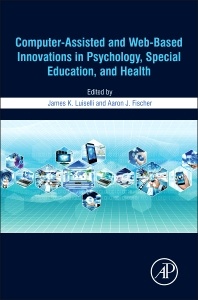Computer-Assisted and Web-Based Innovations in Psychology, Special Education, and Health
Coordonnateurs : Luiselli James K., Fischer Aaron J.

Computer-Assisted and Web-Based Innovations in Psychology, Special Education, and Health examines the rapid evolution of technology among educational, behavioral healthcare, and human services professionals from a multidisciplinary perspective. Section I of the book focuses on Technology for Monitoring, Assessment, and Evaluation, featuring chapters about behavioral, affective, and physiological monitoring, actigraphy measurement of exercise and physical activity, technological applications for individuals with learning disabilities/ADHD, and data analysis and graphing. In Section II, Technology for Intervention, the chapters address telehealth technologies for evidence-based psychotherapy, virtual reality therapy, substance use and addictions, and video modeling. The emphasis of Section III is Technology for Special Education, with chapters on computer-based instruction, alternative and augmentative communication, and assistive technologies. Finally, Section IV considers Technology for Training, Supervision, and Practice, specifically web-sourced training and supervision, legal, regulatory, and ethical issues with telehealth modalities, and emerging systems for clinical practice.
Computer-Assisted and Web-Based Innovations is a primary resource for educating students, advising professionals about recommended practices, accelerating procedural innovations, and directing research.
Section I: Technology for Monitoring, Assessment, and Evaluation 1. Behavioral, Affective, and Physiological Monitoring Jasara N. Hogan and Brian R. Baucom 2. Measurement of Physical Activity Using Accelerometers Jeffer Eidi Sasaki, Kelly Samara da Silva, Bruno Goncalves Galdino da Costa and Dinesh John 3. Technological Applications for Individuals with Learning Disabilities and ADHD Lawrence Lewandowski, Whitney Wood and Laura A. Miller 4. Computer-Assisted Technologies for Collecting and Summarizing Behavioral Data Bryan T. Yanagita, Amel Becirevic and Derek D. Reed
Section II: Technology for Intervention 5. Telehealth Technologies in Evidence-Based Psychotherapy Bethany C. Wangelin, Derek D. Szafranski and Daniel F. Gios 6. Virtual Reality Therapy Max M. North and Sarah M. North 7. Substance Use and Addictions Lara Moody and Warren K. Bickel
Section III: Technology for Special Education 8. Video Modeling Christos Nikopoulos, James K. Luiselli and Aaron J. Fischer 9. Computer-Based Instruction (CBI) Within Special Education Kirsten R. Butcher and J. Matt Jameson 10. Augmentative and Alternative Communication (AAC) in Intellectual and Developmental Disabilities Jeff Sigafoos, Larah van der Meer, Ralf W. Schlosser, Giulio E. Lancioni, Mark F. O'Reilly and Vanessa A. Green 11. Assistive Technologies for Persons with Severe-Profound Intellectual and Developmental Disabilities Fabrizio Stasolla, Viviana Perilli and Adele Boccasini
Section IV: Technology for Training, Supervision and Practice 12. Web-Based Training and Supervision Dan Florell 13. Legal, Regulatory, and Ethnical Issues in Telehealth Technology Evan H. Dart, Heather M. Whipple, Jamie L. Pasqua and Christopher M. Furlow 14. Emerging Technologies for Clinical Practice Dean McKay, Amy Przeworski and Shannon O'Neill
Aaron J. Fischer is an assistant professor of school psychology and an adjunct assistant professor of psychiatry at the University of Utah. He is a licensed psychologist and board certified behavior analyst. Dr. Fischer has conducted technology-focused research in educational settings, specifically using videoconferencing with teachers and parents during conjoint behavioral consultation. His current research is funded by the University of Utah and Society for the Study of School Psychology, and emphasizes the integration of cutting edge technology in psychological practice both in schools and clinical settings.
- Reviews thoroughly the extant literature
- Categorizes the most salient areas of research and practice
- Comments on future inquiry and application given current technological trends
- Cites appropriate product information and related websites
Date de parution : 01-2016
Ouvrage de 408 p.
15x22.8 cm
Thèmes de Computer-Assisted and Web-Based Innovations in... :
Mots-clés :
ATI; Academic skills; Accelerometer; Activity monitors; Addiction; Addiction Technology Treatment Test; Affective expression; Aided communication; Assistive technology; Attention; Attention-deficit hyperactivity disorder (ADHD); Augmentative and alternative communication (AAC); Autism spectrum disorder (ASD); BSP; Behavioral assessment; Brain training; Challenge behaviors; Children's education; Clinical videoconferencing; Cognitive behavioral therapy (CBT); Cognitive rehabilitation; Computer-based instruction; Computerized treatment; Confidentiality; Constructive engagement; Continuous performance tests; Data collection; Developmental and multiple disabilities; Developmental disabilities; Direct observation; Distance learning; Ecological momentary assessment; Ecological validity; Email; Enacted behavior; Ethical; Evidence-based practice; Evidence-based psychotherapy (EBP); Gestures; High-level cognition; Instructional strategies; Intellectual disabilities; Learning disabilities (LD); Legal; Manual signing; Mild to moderate disabilities; Natural speech production; Physical activity assessment; Picture exchange communication; Psychological disorders; Psychological symptoms; Psychology; Quality of life; Recording; Screen reading; Smart-phone applications; Smart-phone apps; Social networking; Social validation; Special education; Speech-generating devices (SGDs); Substance use disorder; Supervision; Sympathetic nervous system; Technology; Telehealth; Telemedicine; Telemental health; Telesupervision; Treatment modality; Treatment of problem behavior; Unaided communication; Universal design; Video modeling; Videoconferencing; Videogames; Virtual environments; Virtual presence; Virtual reality therapy (VRT); Visual aids; Visual instruction



